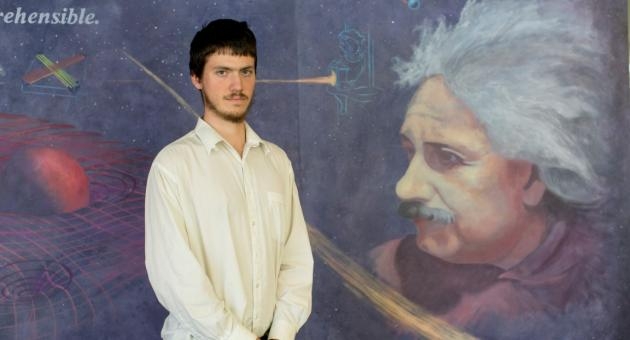Department of Energy fellowship propels physics grad

While an undergraduate at Temple, Eric D. Hunter worked in the lab of Physics Professor C. J. Martoff, who is involved in dark matter research. Hunter also earned a U.S. Department of Energy fellowship and spent 12 weeks during the summer of 2012 at Italy’s Gran Sasso National Laboratory, one of the world’s leading dark matter detection facilities. Following graduation, he will pursue graduate studies at the University of California, Berkeley.
Temple Times: What got you interested in physics?
Eric Hunter: I’m motivated by a compelling need that a lot of young people in every generation feel, and that’s to do something about the impending energy crisis. I became convinced I could make a meaningful contribution to more people if I were to go into something like physics or engineering and do energy research. The more people I talked with the more obvious it became that if you want to make a difference in alternative energy, even if you think you might want to be an engineer, you should start with physics.
TT: How did you get involved with Dr. Martoff’s research?
EH: I met Dr. Martoff the first day I visited Temple’s campus. He was working on this project, an aqueous scintillator, which I became very interested in. It was the Temple physics project involving the most photochemistry.
TT: What led you to apply for the DoE fellowship?
EH: (Physics Associate Professor) Chyan Long Lin was encouraging me to look for research experiences elsewhere because he knew that I wanted to apply to graduate school. Graduate schools really don’t like if all your research experience is at your home institution, so it’s beneficial if you’ve had research experience somewhere else. So I applied for the fellowship and I was selected.
TT: What was it like visiting a foreign country to do your fellowship?
EH: That part was definitely a bonus. It was really fun learning the language, to the extent that I did learn it. For the most part, the Italian culture is fun and welcoming for most visitors. My old Latin teacher from high school also insisted that I spend a day visiting Florence and a day in Rome.
TT: What will you be doing at U.C. Berkeley after you graduate?
EH: I am going to work with Marjorie Shapiro, who does work at the Large Hadron Collidor at CERN (the European Organization for Nuclear Research) in Geneva, Switzerland. She works on ATLAS, which is the detector inside the collider. Although I haven’t begun working with her yet, I’m anticipating working on the detector’s electronics.
TT: How valuable was your fellowship experience in being accepted at Berkeley?
EH: I would have been surprised to have been accepted at Berkeley if I had not gone to Gran Sasso. Most of the impressive things that I’ve done as an undergraduate have been a result of the dark matter detection research that I been involved with.